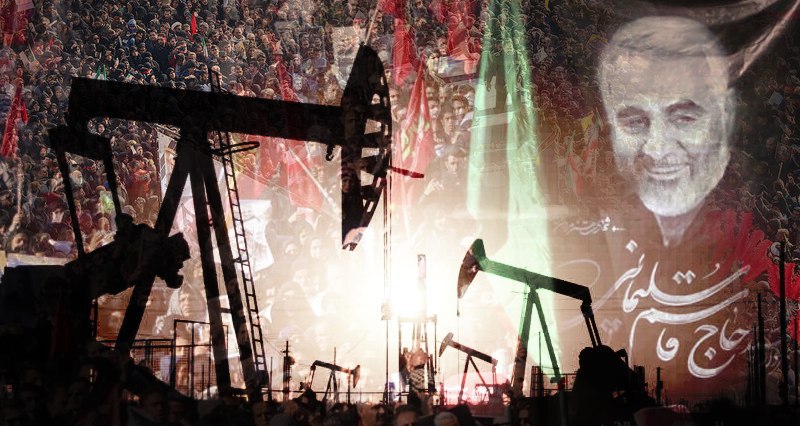Oil prices increased in the final months of the previous year and after the drone’s attacked the Aramco refinery. However, after Aramco was able to reach its level of production and export capacity before the attack, relative stability returned to the oil market. Subsequently, there was no change in the oil market, given the surplus oil supply in the market and the slowdown in the major oil-consuming countries. Geopolitical developments have a direct impact on the oil market. Any insecurity along the energy transit route and in oil-producing areas will raise oil prices, which is usually temporary. Balance returns to the market as security is secured along the transit route and tension is relieved in the region. But in cases where other oil producers cannot offset the deficit of one or more other countries and the tension in the region continues, oil prices will rise. If demand for oil exceeds supply, oil prices will rise further.
The small move in oil prices following Soleimani’s death shows the strategic benefit of U.S. shale. https://t.co/AIjIHOMsPh
— Senator John Cornyn (@JohnCornyn) January 8, 2020
THE GEOPOLITICS STEMMING FROM THE KILLING OF QASEM SOLEIMANI
After the US drones killed Qasem Soleimani at Baghdad airport, the immediate market hit the oil market. The main reason for the increase in the price of oil was the oil market’s concern about the possibility of Iran’s retaliation. The benchmark WTI jumped as much as 4.53 percent to $65.54 a barrel before settling down slightly after Iran unleashed its first response to the US assassination of military commander Qasem Soleimani.
QATAR
As the largest LNG producer and exporter, Qatar has always had good relations with Iran. The day after Qasem Soleimani’s assassination, Qatari Foreign Minister Mohammed bin Abdul Rahman al-Thani left for Tehran and met with Javad Zarif. All of Qatar’s LNG exports are shipped from the Strait of Hormuz, and any conflict in the region will disrupt LNG exports. Following the assassination of Qasem Soleimani, Qatar issued a statement urging the parties to show their utmost restraint and to refrain from bringing the region into a new wave of tensions.
The first round of talks on #regional issues between
Iranian Foreign Minister @JZarif and Foreign Minister of #Qatar Mohammed bin Abdulrahman Al Thani was held in Tehran. The second round of talks is being held privately. pic.twitter.com/ywwARM5kVa— Government of the Islamic Republic of Iran (@Iran_GOV) January 4, 2020
IRAQ’S PLAN TO BOOST OIL PRODUCTION AND EXPORTS
Iraq, one of OPEC’s major oil exporting countries, has sought to increase oil production and exports in recent years by facilitating foreign investment. It holds 12% of the world’s proven oil reserves. Iraq hit record production figures in August with an output of 4.88 million barrels per day (bpd), according to S&P Global Platts, amid an OPEC drive to cut production. In the medium term, the country plans to produce 5 million barrels per day by the end of year 2020, in long term Iraq planning to produce 7 000 000 bpd by 2030.
Any insecurity in Iraq – after the assassination of Qasem Soleimani and the potential for conflict in the region and Iran’s retaliation against US goals and interests in the region – will have a direct negative effects on national security and its oil production capacity.
INSECURITY IN THE STRAIT OF HORMUZ AND THE ATTACK ON SAUDI ARABIA’S ENERGY INFRASTRUCTURE
Earlier last spring, as Iran’s oil exports continued to decline, the Strait of Hormuz witnessed increased insecurity. The seizure and attack on oil tankers led the major energy-consuming countries to try to reduce tensions in the region by means of diplomacy tools. In the meantime, the US has called for a greater presence in the region by establishing a maritime alliance. Iran also offered to form a regional coalition of peace with the hope to increase maritime security in the region, which was not welcomed by regional countries.
#Iran's FM questioned #US plans for a coalition for a "peaceful resolution" in the Middle East while listing repeated Iranian diplomatic initiatives
Zarif on Twitter listed eight diplomatic initiatives by Iran since 1985, including a peace plan for Yemen in 2015 pic.twitter.com/m0J9bNPnkg
— EHA News (@eha_news) September 20, 2019
Drone’s attack Aramco refinery facilities – In addition to the reduction of Aramco oil production and export capacity, Saudi Arabia’s weakness in its energy infrastructure security has become more apparent. The United States decided to sell the Patriot missile defense system to Saudi Arabia after it sent troops to protect Saudi Arabia’s energy infrastructure.
CHINA’S OIL IMPORTS FROM THE STRAIT OF HORMUZ AND THE IRAN-CHINA RELATIONS
Selling oil on the gray market or selling oil through the third country is one of the ways in which Iran has managed to retain some of its market share. China is one of the countries buying oil in the gray market. The US-Chinese trade war also made conditions for the continued sale of Iranian oil to China in the gray market easier. Last week, Iran, along with China and Russia, launched a naval maneuver in the Indian Ocean to demonstrate that it has not been isolated and has been able to maneuver with two major regional and global powers.
More than 50% of China’s imported oil is shipped through the Strait of Hormuz. It also imports about 30% of its LNG via the Strait. Hence, any insecurity along the energy transit route will directly affect energy security and economic growth. Obviously, after the assassination of Qasem Soleimani, China will use all the essential means to prevent escalation in the region and possible Iranian retaliation.
A POSSIBLE RETALIATORY ACTION BY IRAN AND THE ENERGY MARKET
Iran is expected to take retaliatory measures after the killing of Qasem Soleimani, but it is not easy to predict and estimate its severity. They are likely to act directly against US interests and bases in the region, or Iranian proxy groups may attack US interests in the region, or target Saudi Arabia’s energy infrastructure. If the severity of the potential attack on the Aramco refinery facilities is more than that of the drone attack on the Aramco refinery facilities, the geopolitical risk in the region will increase. In the meantime, the question of whether Saudi Arabia is prepared to face such attacks emerges. If there is an attack on oil companies or oilfields in the region, then oil companies are highly likely to abandon or suspend their operations. Under such circumstances, the risk of investing in oil projects in the region will increase.
It is obvious that the United States will increase the level of security measures to protect its bases in the region as well as its embassies, after the Assassination of Qasem Soleimani
https://twitter.com/Marc_F_Martinez/status/1214228259312930816
US announced the deployment of more than 3,000 new troops to the Middle East immediately after the assassination of Qasem Soleimani. The United States has announced the goal of sending a large number of troops to confront possible violence.
Iran’s retaliatory action at any rate, whether or not it will endanger China’s energy security and the rest of the major energy-consuming countries. Oil and LNG companies will increase the cost of shipping these resources. Insurance companies will also increase the insurance premiums of oil tankers. It should be noted that the energy market in Iran’s retaliatory action is not ready nor secure in the Strait of Hormuz, and its energy projects and concerns over Iran’s retaliatory action will continue for a long time in the region and in the global energy market.
THE POLITICAL CRISIS IN IRAQI OIL
Iraq is now facing a political crisis as one of the major oil markets that has been lifted to boost exports has reinforced the likelihood of lower exports and rising oil prices on the world market. Concerning the task of the global oil market, as tensions rise in the region, it can be said that if the tensions persist or change in the political situation in Iraq, then the insecurity market can be predicted. Although Iran does not export much oil to the world market, the world market is worried about the prospect of Iraq’s oil exports.
Oil buyers in Asia are increasingly wary that the worsening dispute between the U.S. and Iran could disrupt shipments from Iraq https://t.co/4ZKrJKkvP7
— Bloomberg (@business) January 6, 2020
US OIL IMPORTS FROM IRAQ
The US needs different types of oil to produce different petroleum products. However, the domestic oil spill does not include the types of crude oil needed to produce the US petroleum products. Production, access, refining, and demand for oil vary across the US. There are many parts of the United States that do not have access to shale oil fields through the pipeline. Major shale oil production areas in the United States are within easy reach of most oil access infrastructures as well as product refining and transportation facilities located primarily in central and southern America. These issues illustrate both the need for flexibility in international oil trade and why the United States continues to import large volumes of oil and export much of its oil.
US crude oil imports from Iraq exhibit all kinds of Ironies.
If relations deteriorate between the US and #Iraq, will the US ban imports of Iraqi crude the same way it did with #Venezuela?
The only problem is: #Crude_Quality_Matters pic.twitter.com/3RymN481mg
— Anas Alhajji (@anasalhajji) January 5, 2020
The oil price spike could affect China’s economy most of all, as China is the world’s largest importer of crude oil, and any fluctuation in oil prices will have a significant impact on its economy. Therefore, it is desirable for America, which considers China as its main competitor in the world of economy, to be more involved in oil price fluctuations so that the United States can gain the most in the tariff war.
On the other hand, the shale oil industry, which now faces a serious surplus of oil supply with a peak output of more than 8 million barrels these days, needs more than any other factor to boost oil prices in order to continue its costly life. Experts argue that Americans are increasingly seizing on Iraq’s oil markets and achieving energy sovereignty so that they can diversify their oil product portfolio as well as impose pressure on Iran.

















Leave a Reply